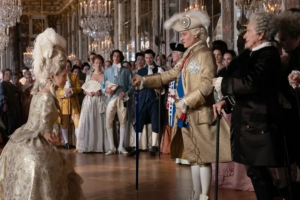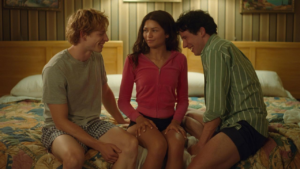Reviewed by GREG KING
Director: Clea DuVall
Stars: Kristen Stewart, Mackenzie Davis, Victor Garber, Mary Steenburgen, Alison Brie, Mary Holland, Dan Levy, Aubrey Plaza, John Dorman.
Hollywood seems to produce a new Yuletide comedy every year – and while some are really good, instant classics that you can watch over and over many times, some are overly mawkish and awash in sentimentality. Others are almost instantly forgettable. Happiest Season is a wryly observed comedy that taps into the familiar tropes of the dysfunctional family gathering that is a constant of many Christmas movies. But what sets this apart from the pack is that it is also a coming out tale set against the backdrop of a Christmas family gathering, a time in which guilty secrets, regrets, resentments, bitter memories all burst to the surface in an emotional pressure cooker that threatens to undermine the happy gathering.
Abby (Kristen Stewart, better known for the Twilight series) is a graduate student who has been in a relationship with Harper (Mackenzie Davis) for the better part of a year. On an impulse, Harper invites Abby home to meet her family and celebrate Christmas. Abby plans to propose to Harper during this time. But then Harper admits that she has not yet come out to her conservative family, which leads to Abby questioning the depth of their relationship.
Abby’s father Ted (Victor Garber, from Alias, etc) is very conservative and involved in local politics, concerned with image and respectability and is considering a run for mayor. His wife Tipper (Mary Steenburgen, from Book Club, etc) is concerned with trying to portray the perfect family through her Instagram account. Both parents have high expectations of their daughters, who have a competitive relationship as they attempt to please their parents and curry favour at the expense of each other. Older sister Sloane (Alison Brie, from tv series Community, etc) is married with a family but she is uptight, while Jane (Mary Holland, who co-wrote the script) is overly enthusiastic and clinging and largely ignored by the family.
Abby is introduced as Harper’s straight flatmate, which leads to some comic misunderstandings and eventually Harper’s little white lie has consequences. Abby meanwhile meets Riley (Aubrey Plaza, from Parks And Recreation, etc) Harper’s former childhood friend and begins to understand how difficult their relationship may be with Harper reluctant to come out of the closet publicly. Abby also receives some advice from her empathetic gay best friend John (Dan Levy, from hit sitcom Schitt’s Creek, etc).
The ironically titled Happiest Season is the first all-star LGTBQ Christmas romcom produced by a major studio, but it also a universally accessible film that nicely taps into the spirit of the season. It explores themes of gender, identity, family, and depicts the usual tropes of the dysfunctional family gathering. Happiest Season has been written and directed by actress Clea DuVall (the tv series VEEP, etc), and has a deeper personal significance for her, depicting characters and experiences that she was keen to explore on screen. This is her sophomore feature, following 2016’s The Intervention, which also explored complicated family relationships. The script contains a deft mix of comedy, physical humour, arch dialogue and painful emotional moments.
Stewart brings a good sense of comic timing and a nicely deadpan style to her performance here, but she also imbues Abby with an inner strength as she tries to come to terms with her relationship with Harper. Davis nicely softens Harper’s cruel edges. There is good chemistry between Stewart and Davis. Steenburgen brings a suffocating and condescending quality to her performance as Harper’s well-meaning but somewhat naïve mother who is clearly obsessed with her idea of the perfect family. Plaza and Levy provide some of the best moments and bring some genuine emotional depth to the material.
The film has been nicely shot on location in Pittsburgh by cinematographer John Gulesarian (the gay themed Love, Simon, etc. There is some good production design from Theresa Gulesarian and Amie Doherty’s cheery and perfectly pitched score complements the material.
★★★



